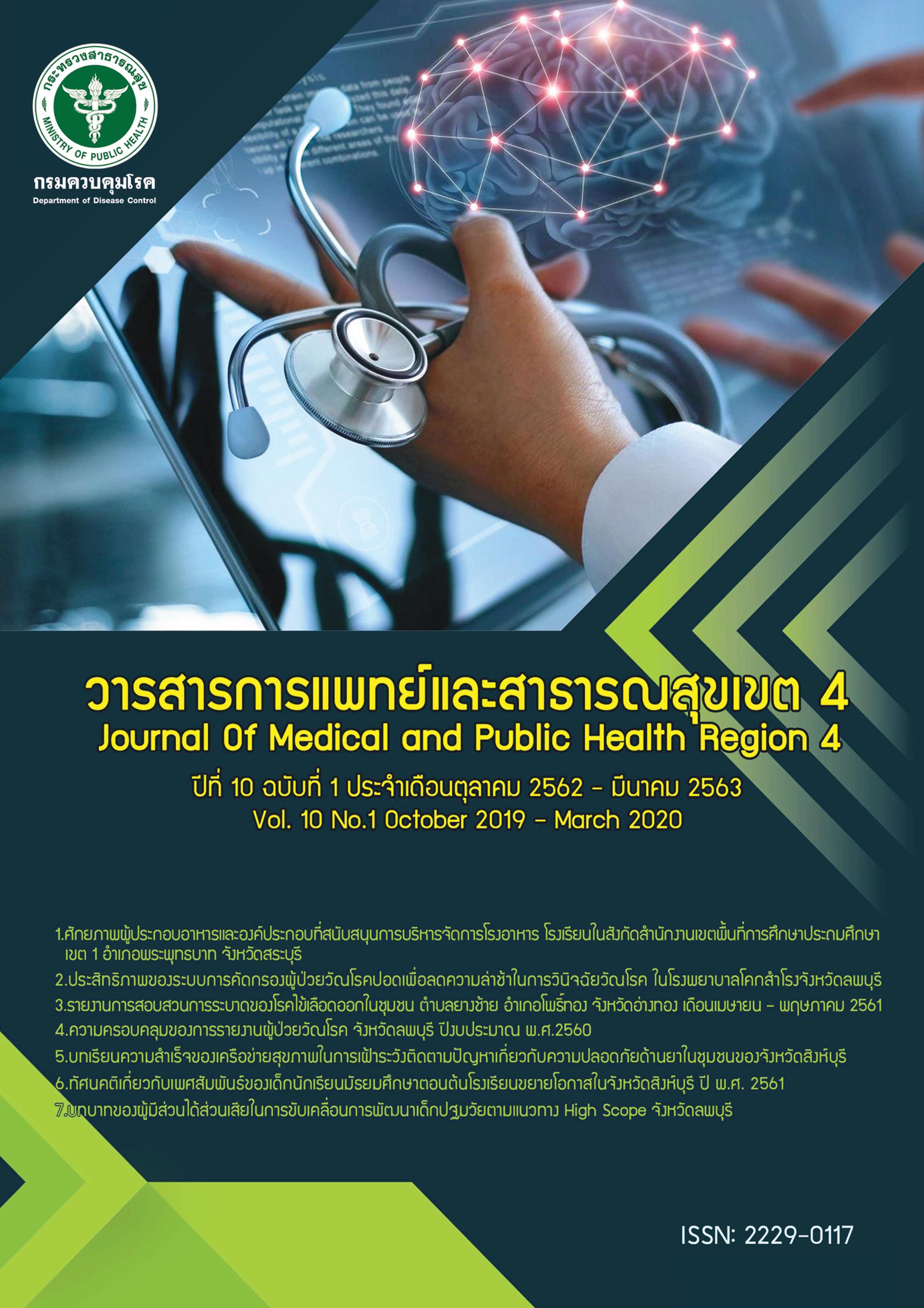The Stakeholders’ Role of the Mobilization for Early Childhood Development under the High Scope Guideline, Lopburi Province.
Main Article Content
Abstract
This study aimed at studying into the Stakeholders’ role of the mobilization for early childhood development under the High Scope Guideline, Lopburi Province, and at preparing for proposal to develop ways and methods in managing the Stakeholders for the mobilization for early childhood development under the High Scope Guideline, Lopburi Province. Data were collected by interview and meeting with groups for decoding the lessons. Samples were the Stakeholders in the mobilization for early childhood development, selected by purposive sampling, consisting of coaches (4 persons), teachers (8 persons) of the early childhood center, parents (86 persons), and the sub-district administrative organization executives (4 persons). The study result revealed that the Stakeholders played role in mobilizing the early childhood development where 1. the coaches promoted the activities under High Scope course by the procedure called “Plan Do Review” with monitoring and After Action Review (AAR) meeting every time, being the coordinators between teachers and the local administrative organization executives as well as parents; 2. teachers of the early childhood development center prepared and arranged the activities under the procedure called “Plan Do Review”, following the assessment for the development and having systematic record, with the meeting among teachers, coaches, and executives teams to jointly find solutions; 3. parents arranged the activities with the children, following up the children development, changing the ways in raising children under the advices; 4. executives concentrated on the promotion of early children, supporting the fund, and buildings and facilities, and empowering the teachers. However, there should be the developments of the proposal on the development of ways of the development for the Stakeholders for the mobilization for early childhood development under the High Scope Guideline, Lopburi Province further, as follows: 1. coaches must develop themselves to be of sufficient potential and there must be sufficient number of them and the coaches should also be provided to work in the provincial-level agencies; 2. teachers of the early childhood center: there should be teachers who graduate from early childhood courses in the ratio of 1 teacher per 10 children, with the assessment for teachers’ teaching by third party; 3. parents should be well prepared and should be imbued with the right attitudes in taking care of early children, promoting the early children to play according to their own imagination from their ages rather than focusing them to be able to read and write; 4. executives should prepare for Memorandum of Understanding (MOU) between the governor of the province and the local administrative organization executives to promote the early childhood development and to mobilize the promotion of early childhood development further.
Article Details
References
2. กระทรวงการพัฒนาสังคมและความมั่นคงของมนุษย์. แนวทางการดำเนินงานปี 2561 – 2564. กรุงเทพมหานคร: . คณะอนุกรรมการส่งเสริมการพัฒนาเด็กปฐมวัยระดับจังหวัดและกรุงเทพมหานคร; 2561.
3. Heckman JJ. The case for investing in disadvantaged young children. CESifo DICE Report 2008; 6(2): 3-8.
4. Heckman JJ, Moon SH, Pinto R, Savelyev SA, Yavitz A. The rate of return to the High/Scope Perry Preschool Program. J Public Econ 2010; 94(1-2): 114-28.
5. Heckman JJ, Pinto R, Savelyev P. Understanding the mechanisms through which an influential early childhood program boosted adult outcomes. Am Econ Rev 2013; 103(6): 2052-86.
6. มหาวิทยาลัยหอการค้าไทย. โครงการลดความเลื่อมล้ำด้วยการศึกษาปฐมวัยที่มีคุณภาพ “ไรซ์ไทยแลนด์”. [สืบค้นเมื่อ 15 สิงหาคม 2562]. แหล่งข้อมูล: https://riece.org.
7. นวลจันทร์ จุฑาภักดีกุล. แบบประเมิน “EF”เด็กปฐมวัย คัดกรองความบกพร่องของอารมณ์สู่แนวทางใหม่พัฒนาการเด็กไทย. [สืบค้นเมื่อ 19 สิงหาคม 2562]. แหล่งข้อมูล: https://www.hsri.or.th/researcher/media/news/detail/7643.
8. นวลจันทร์ จุฑาภักดีกุล. ประเมิน ‘EF’ เด็กปฐมวัย คัดกรองความบกพร่อง ‘ยับยั้งอารมณ์-สมาธิสั้น’ นำร่อง 200 โรงเรียน. [สืบค้นเมื่อ 22สิงหาคม 2562]. แหล่งข้อมูล: https://www.hfocus.org/content/2016/12/13149.
9. ชฎาภรณ์ ชื่นตา, สุภาพร แก้วใส, สมจิต แซ่ลิ้ม, เพียงนคร คำผา. การพัฒนาการเฝ้าระวังและส่งเสริมพัฒนาการเด็กปฐมวัยแบบบูรณาการในศูนย์พัฒนาเด็กเล็ก จังหวัดยโสธร. [สืบค้นเมื่อ 15กรกฎาคม 2562]. แหล่งข้อมูล:http://www.pkyasothon.org/research/data/childdevelopment.pdf.
10. สุพรรษา เทียมทัด. การบริหารจัดการที่ส่งผลต่อการบริการของศูนย์พัฒนาเด็กเล็กในจังหวัดเพชรบุรี. Veridian E-Journal Silpakorn University ฉบับภาษาไทย 2559; 9(3): 1069-80. [สืบค้นเมื่อ 10 มิถุนายน 2562]. แหล่งข้อมูล: https://www.tci-thaijo.org/index.php/Veridian-E-Journal/article/view/75643.


